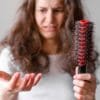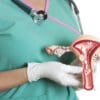Managing Alopecia with PCOD: A Comprehensive Guide
Are you struggling with hair loss due to PCOD? Alopecia, or hair loss, is a common symptom of PCOD that affects many women. It can be frustrating and disheartening to see your hair thinning or falling out, but there are steps you can take to manage this condition and promote healthy hair growth.
At Fitpaa, we understand the challenges of managing PCOD and its associated symptoms. That’s why we’ve developed a comprehensive approach to help women with PCOD manage their hair loss and achieve their health and fitness goals. In this article, we’ll explore the causes of alopecia in PCOD, and provide practical tips and strategies for managing this condition.
Understanding Alopecia in PCOD
PCOD is a hormonal disorder that affects women of reproductive age. It is characterized by the presence of multiple cysts on the ovaries, irregular menstrual cycles, and high levels of androgens (male hormones) in the body. These hormonal imbalances can lead to a range of symptoms, including hair loss.
Alopecia in PCOD is caused by a combination of factors, including hormonal imbalances, inflammation, and insulin resistance. Androgens, such as testosterone, can cause hair follicles to shrink and produce thinner, weaker hair. Inflammation can damage hair follicles and disrupt the hair growth cycle. Insulin resistance, a common feature of PCOD, can also contribute to hair loss by disrupting the body’s metabolic processes.
Managing Alopecia with PCOD
While there is no cure for alopecia in PCOD, there are several strategies you can use to manage this condition and promote healthy hair growth. Here are some tips to get you started:
1. Optimize your diet: A healthy, balanced diet is essential for managing PCOD and promoting healthy hair growth. Focus on whole, nutrient-dense foods, such as fruits, vegetables, lean proteins, and healthy fats. Avoid processed foods, sugary drinks, and refined carbohydrates, which can exacerbate insulin resistance and inflammation.
2. Exercise regularly: Regular exercise can help improve insulin sensitivity, reduce inflammation, and promote healthy hair growth. Aim for at least 30 minutes of moderate-intensity exercise, such as brisk walking or cycling, most days of the week.
3. Manage stress: Stress can exacerbate hormonal imbalances and inflammation, which can contribute to hair loss. Practice stress-management techniques, such as meditation, yoga, or deep breathing, to help reduce stress and promote relaxation.
4. Consider supplements: Certain supplements, such as biotin, iron, and vitamin D, may help promote healthy hair growth. Talk to your doctor or a registered dietitian to determine if supplements are right for you.
5. Use gentle hair care products: Harsh chemicals and styling products can damage hair follicles and exacerbate hair loss. Use gentle, natural hair care products, and avoid heat styling and tight hairstyles that can pull on the hair.
Fitpaa’s Approach to Managing Alopecia with PCOD
At Fitpaa, we take a comprehensive approach to managing alopecia in PCOD. Our personalized Fitpaa Capsule includes medical nutrition therapy, medical exercise therapy, medical therapy, and cognitive behavior therapy to optimize your metabolism and promote healthy hair growth. Our expert team of fitness coaches, nutritionists, and doctors will work with you to develop a personalized plan that addresses your unique needs and goals.
Our Fitpaa app provides real-time guidance and support to help you follow your plan and achieve your health and fitness goals. With features like a virtual workout trainer, diet tracker, and progress tracker, you’ll have everything you need to stay on track and see results.
Don’t let alopecia hold you back from achieving your health and fitness goals. With Fitpaa, you can take control of your health and achieve the life you deserve. Request a trial today and start your journey to optimal health and wellness.









